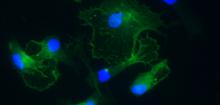The most commonly-occurring strain of malaria, vivax malaria, is difficult to combat because the parasite forms dormant stages known as 'hypnozoites', which embed themselves in the host's liver. They can remain there, unnoticed, for weeks or even years – until suddenly, for unknown reasons, they resume their growth and cause an outbreak of malaria.
So far, no adequate therapy exists to treat this form. Recently, however, we have learned more about the genetic properties of these dormant stages – information that is extremely valuable to pharmaceutical research.











